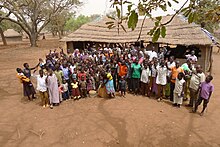Religion in South Sudan (2023 estimate)[1][2]

Christianity is the most widely professed religion in South Sudan, with significant minorities of the adherents of traditional faiths and Islam.
President Salva Kiir, a Christian, while speaking at Saint Theresa Cathedral in Juba, stated that South Sudan would be a nation which respects freedom of religion.[3] The reported estimated relative proportions of adherents of traditional African religions and Christianity have varied.[4][5][6][7][8] A 2019 study found that Protestants outnumbered Catholics in South Sudan.[9]
History
[edit]
Christianity has a long history in the region that is now South Sudan. Ancient Nubia was reached by Coptic Christianity by the 1st century, and missionary activity from Ethiopia consolidated that community. In 1920, the Protestant Church Missionary Society originated a diocese.
Religious membership
[edit]Background
[edit]In the early 1990s, official records of Sudan as a whole (Sudan and South Sudan) showed that a large percentage adhered to African traditional religions (17%) and Christianity (8%) (though both located mainly in the south, some also at Khartoum). Among Christians, most are Catholic and Anglican, though other denominations were also active, and traditional African religions' beliefs were often blended with Christian beliefs.[10][11][12]
The Anglican and Catholic churches both claimed large membership; the Anglican Communion claimed 2 million members in 2005 in the Episcopal Church of the Sudan.[13] The third largest denomination was the Presbyterian Church in Sudan.[14]
Membership in the 2020s
[edit]The 2020 Pew-Templeton Global Religious Futures Project report estimated that Christians made up 60.5% of the population, while followers of indigenous (animist) religions made up 32.9% and Muslims, 6.2%. The remainder of the population was made up of followers of Baha’i, Buddhist, Hindu, and Jewish faiths;[15] however, the country’s population displacement made it difficult to collect accurate details.
In 2022 the new Catholic bishop of Rumbek, Christian Carlassare, stated that "More than half the population of South Sudan is Christian, only 8% are Muslim. Other groups live on the margins, and have not drawn close to the Gospel. However, we live in a country where Christianity is often no more than skin deep, it hasn't grown roots in the life of the population."[16]
International visits
[edit]Since its independence in 2011, South Sudan has been frequently visited by global religious leaders. Franklin Graham led the Hope for A New Nation Festival in Juba in 2012, gathering 95,000 attendees.[17] On 12 November 2019, evangelist T. B. Joshua from Nigeria addressed the South Sudanese nation at the Presidential Palace in Juba in the presence of President Salva Kiir Mayardit.[18] From 2-4 February 2023, Justin Welby (Anglican Communion), Pope Francis (Catholic Church), and Iain Greenshields (Church of Scotland Moderator) visited South Sudan through a three-day "pilgrimage of peace to the world's newest nation".[19]
See also
[edit]- Catholicism in South Sudan
- Province of the Episcopal Church of South Sudan and Sudan
- Islam in South Sudan
References
[edit]- ^ "South Sudan". 5 February 2024.
- ^ "South Sudan". Global Religious Futures. Pew Research Center. Retrieved 1 July 2021.
- ^ "South Sudan To Respect Freedom of Religion Says GOSS President | Sudan Radio Service". Sudanradio.org. 21 February 2011. Archived from the original on 12 July 2011. Retrieved 9 July 2011.
- ^ "South Sudan profile". BBC News. 8 July 2011. Retrieved 9 July 2011.
- ^ Eric Kaufmann, Rethinking ethnicity: majority groups and dominant minorities. Routledge, 2004, p. 45.
- ^ Minahan, J. Encyclopedia of the Stateless Nations: S-Z. Greenwood Press, 2002, p. 1786.
- ^ Arnold, G. Book Review: Douglas H. Johnson, The Root Causes of Sudan's Civil Wars. African Journal of Political Science Vol.8 No. 1, 2003, p. 147.
- ^ Sudan: A Country Study Federal Research Division, Library of Congress - Chapter 2, Ethnicity, Regionalism and Ethnicity
- ^ US Institute of Peace, 2019 report "The Religious Landscape in South Sudan"
- ^ Christianity, in A Country Study: Sudan, U.S. Library of Congress.
- ^ "More than 100 dead in South Sudan attack-officials" Archived 28 June 2011 at the Wayback Machine SABC News 21 September 2009 Retrieved 5 April 2011
- ^ Hurd, Emma "Southern Sudan Votes To Split From North" Sky News 8 February 2011 Retrieved 5 April 2011
- ^ "How many Anglicans are there in the Anglican Church in North America?"
- ^ "South Sudan" (PDF). www.apwm.org.au. 2013. Archived from the original (PDF) on 2 October 2013. Retrieved 23 August 2023.
- ^ US State Dept 2022 report
- ^ ACN (4 April 2022). "New bishop in South Sudan: "We must get back on our feet and give hope to the people"". ACN International. Retrieved 15 November 2022.
- ^ Sébastien Fath, "Franklin Graham's Crusade in South Sudan", Afrique Contemporaine, vol 252, issue 4, 2014, p.27 to 49
- ^ "Prophet TB Joshua's Presidential Visit to South Sudan" (Nov 2019)"
- ^ Sarah Fowler, "Pope in South Sudan tells clergy to raise voices against injustice", BBC, 4th of Feb, 2023
Sources
[edit]- Grillmeier, Aloys; Hainthaler, Theresia (1996). Christ in Christian Tradition: The Church of Alexandria with Nubia and Ethiopia after 451. Vol. 2/4. Louisville: Westminster John Knox Press. ISBN 9780664223007.
South Sudan articles | |||||
|---|---|---|---|---|---|
| History | |||||
| Geography | |||||
| Politics | |||||
| Economy | |||||
| Society |
| ||||
| Eastern Christianity |
| ||||||||||||
|---|---|---|---|---|---|---|---|---|---|---|---|---|---|
| Western Christianity |
| ||||||||||||
| Interdenominational organisations |
| ||||||||||||
| |||||||||||||